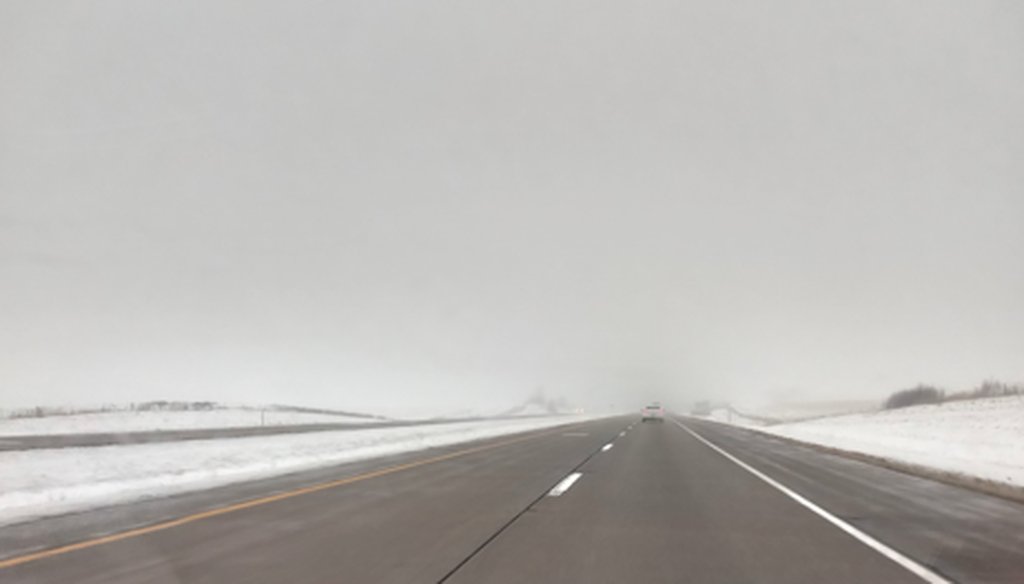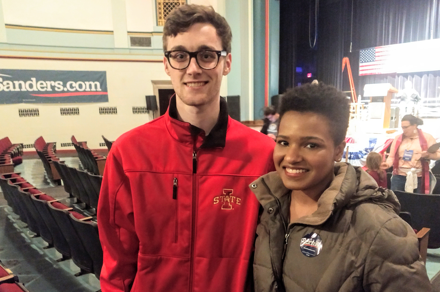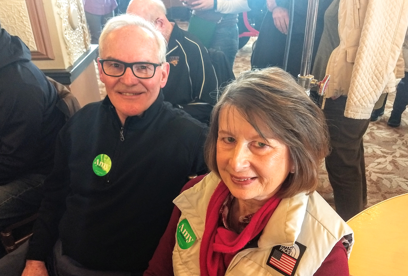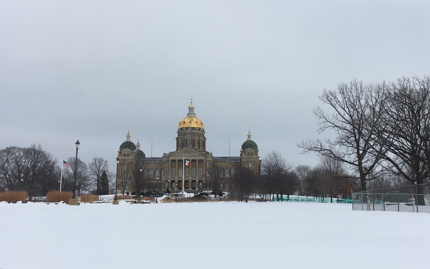Stand up for the facts!
Our only agenda is to publish the truth so you can be an informed participant in democracy.
We need your help.
I would like to contribute

After five days on the road in Iowa, PolitiFact reporters reflect on what they saw. (Louis Jacobson/PolitiFact)
IOWA CITY, Iowa — Our job, most days, is to fact-check what candidates say about themselves and their opponents. That usually happens from our desks in Washington and Florida. But in January, it was time to get up close and personal — in Iowa.
Three PolitiFact staffers spent five days following the Democratic presidential contenders in their closing sprint before the Feb. 3 caucuses. The Iowa crew included Washington, D.C.-based senior correspondent Louis Jacobson, south Florida-based staff writer Amy Sherman, and our audience engagement editor, Josie Hollingsworth, who is based at the Poynter Institute in St. Petersburg, Florida.
All told, we drove roughly 1,100 miles to cover the candidates as they stumped across the state. Stops included town halls for Andrew Yang and Elizabeth Warren in communities along the Mississippi River, a rally for Joe Biden in suburban Des Moines, Bernie Sanders in the college town of Ames, and Amy Klobuchar in Waterloo. Our final stop was a Fox News town hall with Pete Buttigieg.
That African American candidates Kamala Harris and Cory Booker, and Julián Castro, who is Latino, dropped out before the caucuses have left some questioning why Iowa — an overwhelmingly white state — should play such a large role in winnowing the field.
After dropping out, Castro said that Iowa is "not reflective of the United States" and "not reflective of the Democratic Party," and he urged that it lose its crucial spot at the head of the line. Biden didn’t say Iowa should lose its status, but he did acknowledge, "Are they representative historically and practically — based on race and creed and color — of the nation? No, they’re not."
Iowa voters we interviewed vigorously defended their special place in the political calendar.
"We are the crossroads of the United States. We are dead-center of the United States," said Jim Auxier, a retired tool and die maker at a Biden event in Ankeny. "Where can you get a better perspective on the U.S.?"
Others said Iowa shares many of the same challenges as other parts of the country, such as grappling with climate change. Connor Shannon, a 19-year-old who works at a sandwich shop, told us after the Sanders rally that he was concerned about flooding in Iowa, which was severe in some locations in 2019.
"More than ever this election cycle, Iowa is a very relevant place," Shannon said.
Political scientists agree that Iowa has something special to lend the process: A citizenry that is not only used to scrutinizing candidates first-hand, but one that demands it.
According to a recent Iowa poll, one-third of likely Democratic caucus-goers said it is "extremely important" how a candidate has engaged with voters at events.
"Iowa caucus-goers take the process seriously, and are serious about trying to learn about the candidates and put them on the spot with questions," said David Redlawsk, a University of Delaware political scientist and Iowa caucus expert who has attended more than 100 caucus-related events in Iowa this campaign cycle. "Candidates have to be responsive, which is a learning experience for many of them."
The Democratic caucus process allows voters to switch their allegiance on caucus night if the candidate they support fails to reach 15% in the initial round of voting at a caucus site.
As a result, "voters pay attention to multiple candidates rather than locking into one early, and thus spend more time actually comparing and judging between them than primary voters in other states would," Redlawsk said.
Historically, half or more of Iowa voters are late deciders about whom they will support.
"There’s an old saying here that you need to shake hands with a candidate seven times before you caucus for them," said Christopher Larimer, a political scientist at the University of Northern Iowa in Cedar Falls. "That seems to hold."
It held for Nadene and Gary Davidson of Cedar Falls, a couple who attended an Amy Klobuchar event in Waterloo. The Davidsons were "95% behind Amy," but they had attended a half dozen events featuring various candidates and were still seeking out more.
Iowans "really want to do their homework and understand what each candidate is really about and make the best decision," Nadene Davidson said.
Our Sources
Interview with University of Delaware political scientist David Redlawsk in Iowa City, Jan. 23, 2020
Interview with University of Northern Iowa political scientist Christopher Larimer in Cedar Falls, Jan 27, 2020
Interview with Jim Auxier, Iowa voter, in Ankeny, Jan. 25, 2020
Interview with Connor Shannon, Iowa voter, in Ames, Jan. 25, 2020
Interview with Nadene and Gary Davidson, Iowa voters, in Waterloo, Jan. 26, 2020
Other sources linked in article


















































